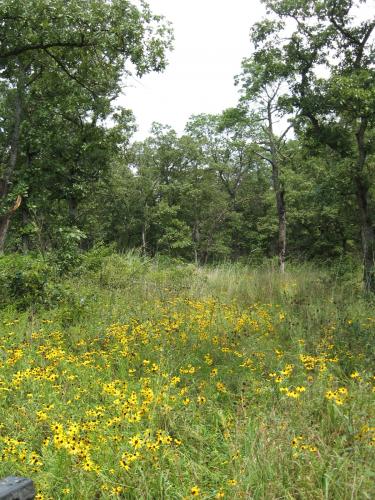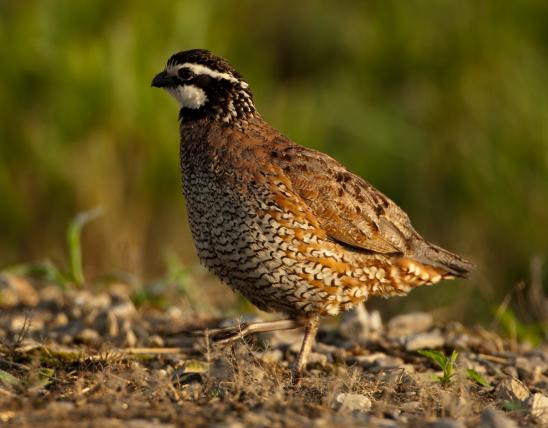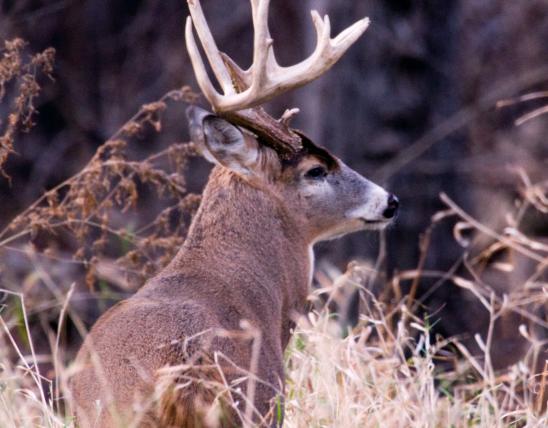
The White area contains 315 acres of timber and 495 acres of open fields. The Conservation Department manages the area primarily for bobwhite quail and cottontail rabbits. Food plot, shrub, and native grass plantings increase habitat diversity. Prescribed fire, forest edge enhancement, and crop field rotations are the cornerstones of the upland game management program.
The area contains a fishing lake, stocked with bass, bluegill, and channel catfish.
- Sunday, 04:00 AM - 10:00 PM
- Monday, Tuesday, Wednesday, Thursday, Friday, Saturday, 04:00 AM - 10:00 PM
Area Regulations
7702 - 3CSR 10-11 - 105 Title; Authority
Chapter 11 of the Wildlife Code applies to this area. The information provided reflects regulations for most activities on this conservation area but does not contain regulations for all possible uses. For more information on area regulations consult the Wildlife Code or call the phone number listed for the area in the area details section.
7702 - 3CSR 10-11 - 110 General Provisions
Department areas designated as open to the public may be accessed and used for hiking; sightseeing; nature observation; entering or remaining on designated portions of department areas; possession of pets and hunting dogs; field trials; use of vehicles, bicycles, horses, and horseback riding; collecting of nuts, berries, fruits, edible wild greens, and mushrooms; camping; tree stands; target shooting and use of shooting ranges; decoys and blinds; use of boats and motors; taking bullfrogs and green frogs; hunting; trapping; and fishing. The locations and times when department areas may be entered, remained on, or used for these activities may be further restricted by Chapter 11 of the Wildlife Code, signs, this conservation atlas, or area maps. In addition to the rules of the Wildlife Code, federal, state and local laws apply on department lands.
The following activities are prohibited on department areas and may not be authorized by a special use permit:
1. Destruction, defacing, or removal of department property
2. Digging or excavating
3. Guiding for pay
4. Military or law enforcement training by nongovernment entities
5. Placing of grain, salt products, minerals, and other consumable products on land
6. Placing or using trail or game cameras or other similar devices
7. Use of paint ball, airsoft, or similar projectile weapons not specifically authorized by this Code
8. Placement of honey bee apiaries
9. Parking or storage of watercraft and commercial vehicles during closed hours
10. Use of fireworks
11. Use of remote-controlled boats or land vehicles
12. Prospecting, exploring, mining, or extracting minerals, metals, oil, natural gas, or other nonrenewable resources, except as specifically approved by the commission
13. Commercial or political advertising, except for commercial advertising by authorized concessionaires or by vendors participating in department events
Other activities not listed above, including commercial use and vending, may be authorized by a special use permit when the activity is compatible with other authorized activities. Special use permits may be issued only by the area manager or their designee. Issuance of a special use permit is at the discretion of the department. Application for a special use permit does not guarantee that one will be issued.
Signs, posted regulations, or area maps may further restrict activities, including designating portions of department areas as open or closed to public use. Department areas or designated portions of department areas may be closed, or regulations may be changed, through posting to protect the public from hazardous conditions and threats to public safety, to protect fish and wildlife resources, and for special events or resource management activities where public use conflicts are likely to occur. All persons entering, remaining on, or using a department area shall abide by signs, posted regulations, and area maps.
Waste containers located on department areas may be used only for disposal of garbage, trash, refuse, or rubbish generated on the department area. NOTE: Waste containers are not provided on all department areas.
Collecting wild animals (including invertebrates) and their unprocessed parts is prohibited except under the provisions of a valid Wildlife Collector’s Permit, or as otherwise authorized in the Wildlife Code.
Collecting or possessing wild plants and their unprocessed parts is prohibited except by a Letter of Authorization for Plant Collecting, or as otherwise authorized in the Wildlife Code.
7702 - 3CSR 10-11 - 115 Closings
This department area is open for public use from 4:00 a.m. to 10:00 p.m. daily; however, hunting fishing, trapping, dog training, camping, launching and landing boats is allowed 24 hours a day on areas where these activities are permitted. Parking or storing watercraft or commercial vehicles is prohibited on department areas during closed hours.
7702 - 3CSR 10-11 - 135 Wild Plants, Plant Products, and Mushrooms
Nuts, berries, fruits, edible wild greens and mushrooms may be taken only for personal consumption; EXCEPT on locations designated as Missouri Natural Areas, taking edible wild greens is prohibited. Vegetation, including trees, may not be cut or destroyed.
7702 - 3CSR 10-11 - 130 Vehicles, Bicycles, Horses, and Horseback Riding
State laws regarding the operation, registration and required equipment apply to the operation of motor vehicles on locations open to vehicular traffic on department areas. Vehicle use is restricted to graveled and paved roads and established parking areas, unless otherwise posted.
Except as otherwise posted, the speed limit on department areas is 45 miles per hour.
Unless otherwise posted, bicycles, including electric bicycles as defined in the Missouri Wildlife Code (Chapter 20- Definitions), are allowed on roads open to vehicular traffic and service roads (designated in the online conservation atlas). Bicycles must stay on roads open to vehicular traffic or service roads, or on multi-use trails posted as open to bicycles. Bicycle use is not allowed on service roads passing through designated natural areas (designated in the online conservation atlas). Groups of 10 or more people using bicycles on a department area must obtain a special use permit. Special use permits should be requested at least 30 days in advance at: SpecialUsePermit.
Equestrian use is allowed on roads open to vehicular traffic. Horses must stay on roads open to vehicular traffic or on multi-use trails posted as open to horses. Groups of 10 or more people using horses on a department area must obtain a special use permit. Special use permits should be requested at least 30 days in advance at: SpecialUsePermit.
7702 - 3CSR 10-11 - 140 Camping
7702 - 3CSR 10-11 - 150 Target Shooting and Shooting Ranges
7702 - 3CSR 10-11 - 120 Pets and Hunting Dogs
7702 - 3CSR 10-11 - 180 Hunting, General Provisions and Seasons
Hunting is prohibited on some conservation areas, but allowed on others. Special regulations may apply to hunting. To determine the hunting regulations for this conservation area, consult the Missouri Code of State Regulations in Chapter 11 of the Wildlife Code at the Missouri Code of State Regulations website.
7702 - 3CSR 10-11 - 145 Tree Stands
7702 - 3CSR 10-11 - 155 Decoys and Blinds
7702 - 3CSR 10-11 - 125 Field Trials
7702 - 3CSR 10-11 - 200 Fishing, General Provisions and Seasons
Fishing is allowed on most conservation areas, but prohibited on some. To determine if fishing is an activity that is allowed on this conservation area, and any special regulations that may apply, please consult the Missouri Code of State Regulations in Chapter 11 of the Wildlife Code.
7702 - 3CSR 10-11 - 160 Use of Boats and Motors
Boats (including canoes, kayaks, paddleboards, and sailboats) may be used on waters located on department areas. On lakes and ponds, boats may be used only on waters designated as open to boats. State laws regarding the operation, registration, and required safety equipment apply to watercraft being operated on waters under the control of the department. Boats may not be left unattended overnight.
The use of houseboats, airboats, and personal watercraft are prohibited.
7702 - 3CSR 10-11 - 187 Trapping
7702 - 3CSR 10-11 - 185 Dove Hunting
Use or possession of lead shot is prohibited for hunting doves on this area
Seasonal Hunting and Fishing Information
Turkey - Spring
During the youth spring season, one-half hour before sunrise to sunset.
During the regular spring season, one-half hour before sunrise to 1:00 p.m. Central Daylight Time.
Two male turkeys or turkeys with a visible beard, with the following restrictions:
Only one turkey during the first week of the regular spring season. Hunters who are unsuccessful during the first week, may take two turkey during the second and third week of the season, but both turkey may not be taken on the same day. A turkey harvested during the youth spring season counts toward a hunter's spring season bag limit.
During the spring youth season, only one male turkey or turkey with a visible beard. Youths who take a turkey during the youth season may not harvest their second bird until the second Monday of the regular spring season.
Spring turkey hunting is allowed only on Conservation Department Areas that are listed in the current 2024 Spring Turkey Regulation Booklet. Please reference pages 8-15 in the booklet for information on regulations, methods, and limits for specific conservation areas. If an area that is owned or managed by the department is not listed in the booklet, then spring turkey hunting is not allowed. Click here: 2024 Spring Turkey Regulation Booklet to view the regulations.
The following methods are prohibited for turkey hunting: use of dogs, bait, electronic calls or live decoys. Hunters also may not possess a shotgun capable of holding more than three shells in the magazine and chamber combined; shotshells loaded with shot larger than No. 4; arrows, bolts, and darts containing any drug, poison, chemical, or explosive; and electronic calls or electronically activated calls.
Things to Do When You Visit
Fishing
White Bass
Sunfish
Catfish
Crappie
Black Bass
Hunting
Deer
Archery and Firearms
Antlerless Permits Not Allowed
Turkey
Archery and Firearms
Rabbit
Squirrel
Dove
Quail


























